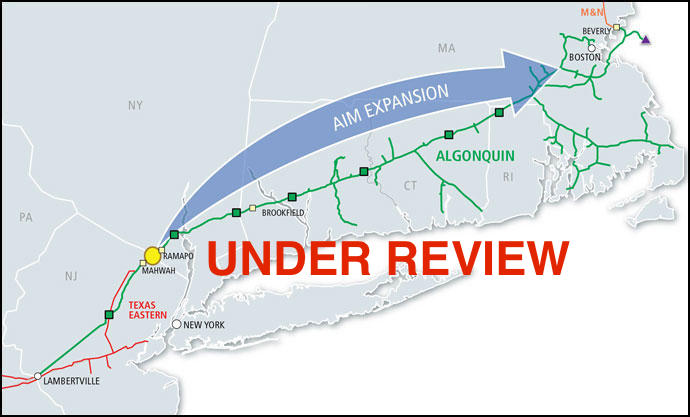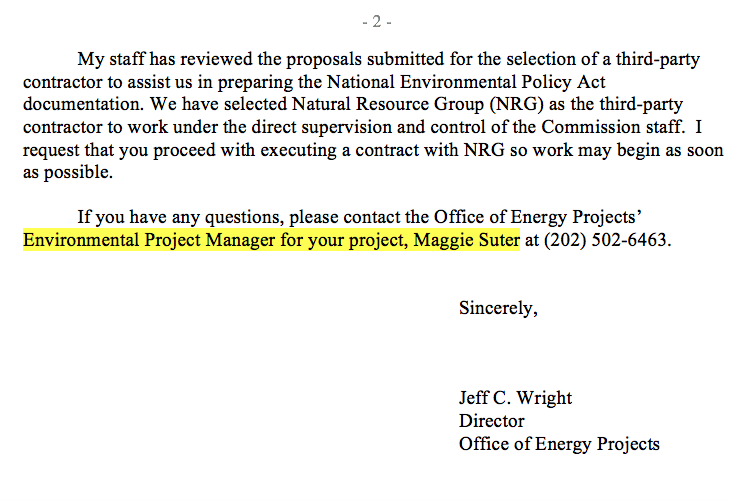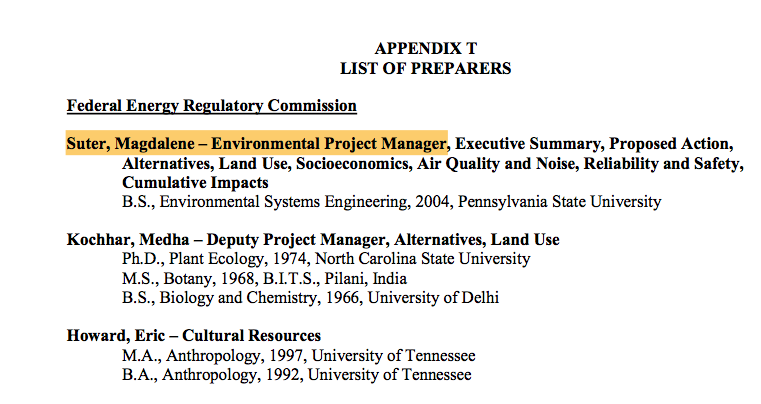Phil Suter, the spouse of Maggie Suter, an official at the Federal Energy Regulatory Commission (FERC) who led the review for two gas pipeline projects by Spectra Energy, is a paid consultant on a related Spectra project.
Experts on ethics in government regulatory bodies told DeSmog this case raises serious red flags, amounting to what appears to be a conflict of interest.
“Suter should have, at the least, disclosed to FERC the conflict, and recused herself from these projects,” says Neil Gordon, an investigator at the Project on Government Oversight, a watchdog group monitoring money in politics.
*Maggie Suter informed FERC about CH–IV‘s work in both projects. In response, FERC removed her from the role of Project Manager in the Cove Point LNG project, but allowed her to remain on the reviewing team in a more limited role. FERC did not require Maggie Suter to recuse herself from reviewing the Atlantic Bridge project.*
Suter and the Spectra Pipeline Environmental Reviews
Beginning in 2013, Spectra proposed three projects to upgrade its existing Algonquin Pipeline in the Northeast U.S. — Algonquin Incremental Market (AIM), Atlantic Bridge, and Access Northeast. While FERC has already approved AIM, which is currently under construction, Atlantic Bridge and Access Northeast are still pending approval.
FERC’s Maggie Suter served as Environmental Project Manager for both AIM and Atlantic Bridge, where she led the environmental review for the two projects. An environmental engineer by training, Suter is a 12-year veteran of FERC.
Project managers play a crucial part in the review process of proposed pipelines, overseeing FERC staff assigned to assess the project’s impacts, coordinating the work of third-party contractors assisting the commission in the review, and serving as lead author of the final environmental reports. Reports benefitting the pipeline company are usually the first step in the ultimate approval of the project.
Yet a DeSmog investigation has found that at the same time, Phil Suter, Maggie Suter’s husband, has been working as a consultant for the Access Northeast pipeline project. Phil Suter is an employee of CH–IV International, a liquefied natural gas (LNG) engineering and consulting firm advising Access Northeast on its LNG component. According to his LinkedIn profile, Phil Suter worked at FERC until mid 2012.
Documents filed at FERC show that Phil Suter has been consulting for the Access Northeast project since at least January 11, 2015 – that is, before FERC published its final Environmental Impact Statement on AIM, which Maggie Suter signed as the lead author.
This also means that when FERC assigned Maggie Suter to serve as project manager for Atlantic Bridge in late February 2015, Phil Suter was already working on Spectra’s Access Northeast project. As in AIM’s final report, Maggie Suter signed off as lead author on Atlantic Bridge’s environmental assessment.
Final environmental reports on both projects concluded they will not significantly impact the environment.
Source: From FERC’s letter to Spectra, announcing Maggie Suter as Environmental Project Manager for Atlantic Bridge.
While Spectra claims the three upgrade projects are independent of one another, opponents point to their interconnectedness. A broad coalition including such organizations as Delaware Riverkeeper and Food and Water Watch have taken FERC to court precisely on these charges. Not only are the three projects upgrades to the very same pipeline, environmental groups point out, but their proposals and review timeframes also overlap at certain points.
Moreover, some aspects of Access Northeast are in fact contingent on the approval of Atlantic Bridge. For instance, Access Northeast plans to upgrade a compressor station in the town of Weymouth, Massachusetts. The construction of that has yet to be approved as part of Atlantic Bridge.
Opponents charge that FERC inappropriately allowed Spectra to segment the three projects, effectively preventing a more thorough review of their cumulative environmental and health impacts.
Source: From FERC’s final Environmental Impact Statement for Spectra’s AIM, showing Maggie Suter as lead author.
Possible Conflict in Dominion Cove Point LNG
A review of historical documents at FERC suggests CH–IV and Phil Suter worked as consultants to a company in another project Maggie Suter was reviewing. While she served as Deputy Project Manager for Dominion’s Cove Point LNG export terminal in 2014, CH–IV worked as Dominion’s consultant.
While CH–IV consulted Dominion during the review period, documents attest to Phil Suter’s personal involvement as part of a CH–IV team working on Cove Point LNG shortly after FERC approved the project in September 2014.
Experts See Red Flags
Experts on ethics in regulatory agencies point to the potential for a conflict of interest in these cases. Dr. Craig Holman, a government affairs lobbyist for the organization Public Citizen, says that FERC’s project manager should probably have recused herself from the projects involving her husband.
“This case seems to invoke 18 U.S. Code § 208, the law which spells out the conditions under which a conflict of interest exists for employees in the executive branch of government. The law encompasses not merely the possible financial gain of the individual government employee involved, but also his or her immediate family. If there is a potential for a pecuniary benefit from the review, she should have recused herself.”
According to Holman, one main reason the law includes immediate family members is to reduce the incentive for industry to hire spouses or kin as a way to bias the government official.
The Project on Government Oversight’s Neil Gordon agrees. Gordon, who researches government contracts, says this case further highlights the problems with the revolving door phenomenon, in which government officials move on to work for the industry they had regulated.
“With Phil Suter moving immediately from FERC to a private firm consulting energy companies regulated by FERC, the chances of his wife finding herself in conflict naturally increase,” said Gordon.
When reached for comment, Maggie Suter referred DeSmog to FERC’s Office of External Affairs. DeSmog asked FERC why Maggie Suter was assigned to Atlantic Bridge and why she did not recuse herself from AIM’s review once her husband began working for Access Northeast.
A FERC spokesperson said in response: “It is FERC’s policy to not comment on personnel matters. All ethics issues at FERC are presented to the Designated Agency Ethics Officer for a determination and any required corrective action.”
The spokesperson did not say whether any “required corrective action” was pursued in this case.
As DeSmog previously reported, former FERC Commissioner Philip Moeller regularly received waivers from FERC’s legal division allowing him to rule on decisions involving energy companies that his wife, lobbyist Elizabeth Moeller, represented. Moeller was on the commission when it approved Spectra’s AIM upgrade.
DeSmog also first revealed the potential conflict of interest involving AIM and Atlantic Bridge’s third party contractor. While reviewing these Spectra projects on FERC’s behalf, Natural Resource Group (NRG), was hired by PennEast Pipeline LLC, a consortium of which Spectra is a member.
Both Phil Suter and Spectra Energy were contacted for comment, but neither responded to DeSmog before this article was published.
*Editor’s Note January 16, 2017: Based on additional information provided by FERC and other sources subsequent to the publication of this article, we have updated the story to clarify the relationships between the projects described and the Suters’ respective roles pertaining to them.
The partners in Access Northeast divided responsibility for the LNG component of the project such that Algonquin Gas Transmission, LLC (a wholly owned subsidiary of Spectra Energy) will own the new LNG storage facility while the electric utility Eversource will operate and maintain the facility. In a document submitted to FERC, Access Northeast stated that CH–IV had been contracted by both these partners for the project: while Eversource hired CH–IV to develop the front end engineering design of the facility, CH–IV will serve as Spectra’s Engineer in the engineering, procurement, and construction phase of the project.
DeSmog also spoke with the two experts quoted in the original story to share with them the updated information; each stands by his original statement.
Craig Holman stated the central point he made in his original quote remains unchanged: Maggie Suter had been in a potential conflict of interest in both the Cove Point LNG and Atlantic Bridge projects. Holman added that it seems like she indeed made the right move by notifying her superiors of these potential conflicts. At the same time, it was her superiors at FERC who apparently made the wrong decisions by allowing her to remain on the team reviewing Cove Point, and by allowing her to lead the review of Atlantic Bridge while her husband was working for Spectra’s related project, Access Northeast. (DeSmog originally asked FERC if Maggie Suter informed her supervisors of the conflict, but FERC chose not to respond to that question.)*
Subscribe to our newsletter
Stay up to date with DeSmog news and alerts









